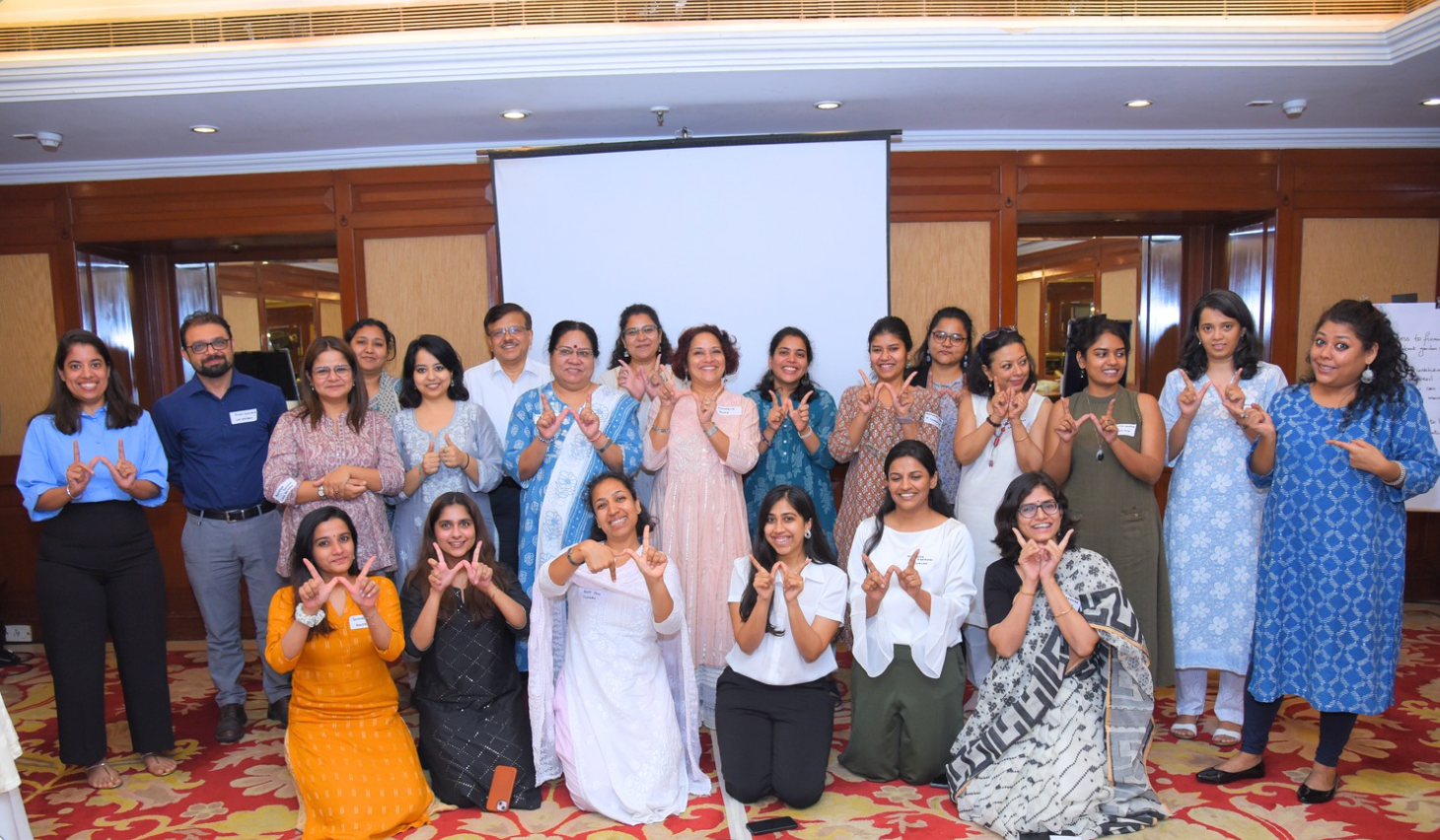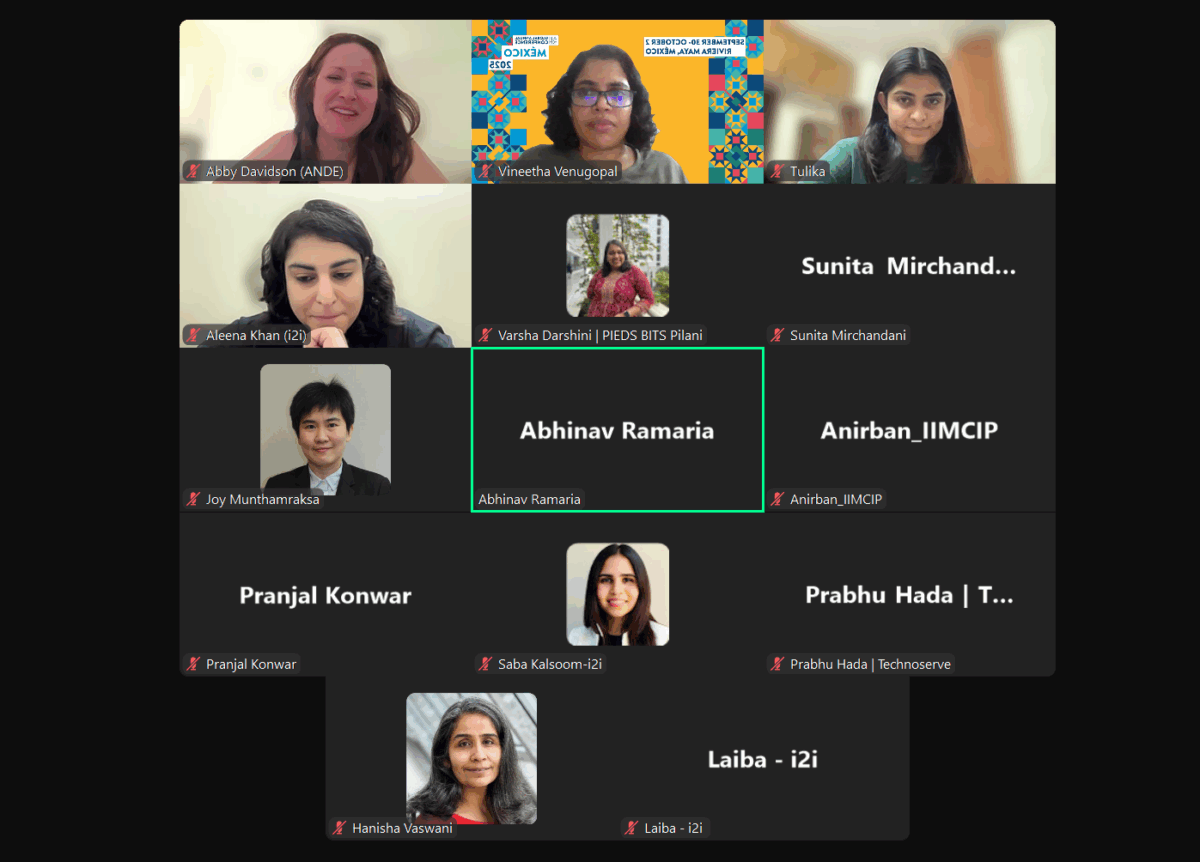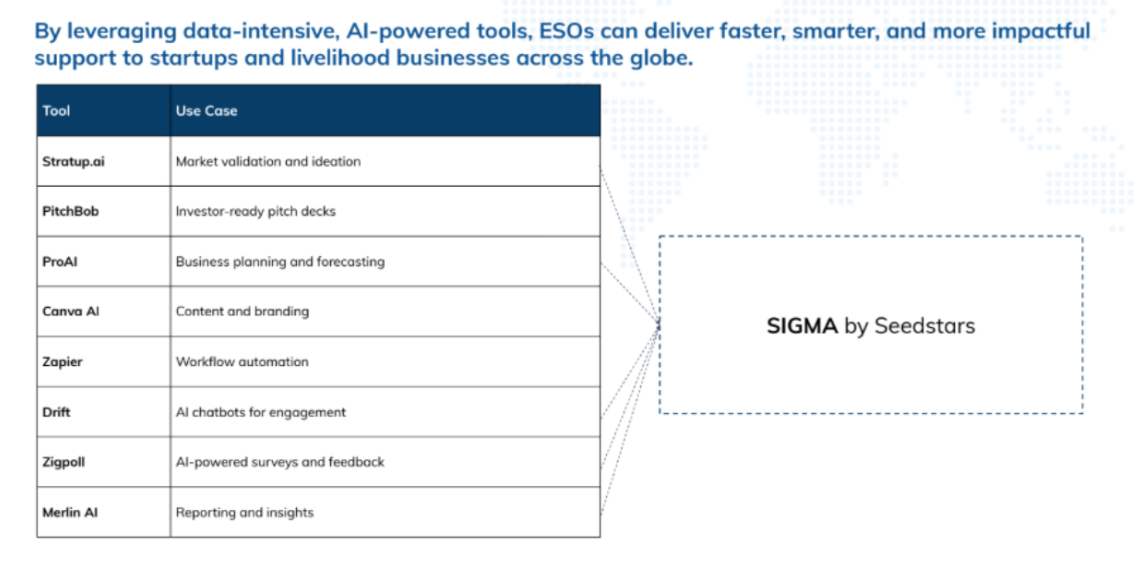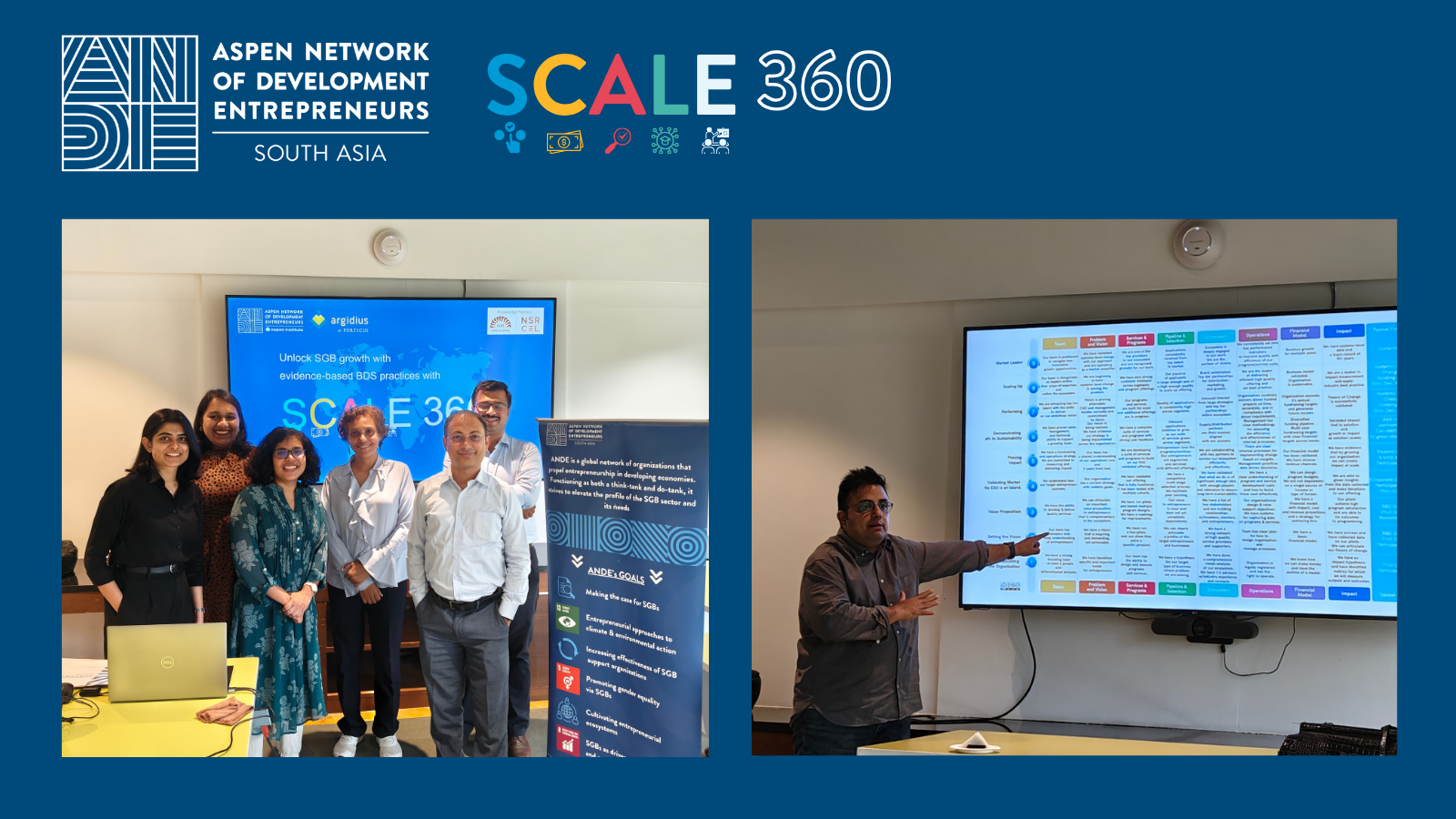
Capturing key highlights, insights, and peer learnings from each session of ANDE’s SCALE 360 India program as it unfolds—offering a front-row seat to the evolving strategies, challenges, and innovations shaping enterprise support in South Asia.
Unlock the Full Potential of Your Business Development Services with SCALE 360
The Aspen Network of Development Entrepreneurs (ANDE) is launching SCALE 360, a new global initiative aimed at strengthening Business Development Service (BDS) providers, including accelerators, incubators, and other entrepreneurial support organizations.
Drawing on insights from the Global Accelerator Learning Initiative (GALI) and the latest academic research, SCALE 360 applies the SCALE framework—Select, Charging, Address, Learning, Lead by Example—to equip BDS providers with evidence-based strategies that drive real impact.
This program brings together carefully selected cohorts of participants for an immersive learning journey, providing hands-on guidance on implementing best practices in BDS programming. Developed in collaboration with local ANDE members and partners, SCALE 360 delivers practical, actionable tools to unlock the growth potential of small and growing businesses (SGBs).
- From Insight to Action: Selecting the Right Enterprise
- Charging for Enterprises: A Necessary Disruption?
- Cracking the Code: Addressing the Real Problems Entrepreneurs Face
- The Power of Learning: How ESOs Grow Through Impact Evaluation
- Lead by Examples: Internal Excellence as a Lever for External Impact
In an evolving entrepreneurial landscape where impact and scalability are increasingly intertwined, ANDE South Asia launched its SCALE 360 India initiative with two intensive sessions on April 21st, setting a purposeful tone for enterprise support in the region.
The day’s proceedings opened with a foundational session on ‘Selecting the Right Enterprise’, foregrounding a critical question for entrepreneur support organizations (ESOs): How do we ensure we’re backing the right startups—not just in mission, but in momentum?
Defining the ‘Why’
Deepak Menon of Village Capital led the conversation by urging organizations to be explicit about their ‘Why’. For example, Village Capital aims to create impact through scaling entrepreneurship and thus focuses on companies that need support to begin moving towards scale. He also discussed their Venture Investment Readiness and Awareness Levels (VIRAL) pathway and peer due diligence process.
Ajay Menon discussed the selection strategies of TechnoServe’s Greenr accelerator, including driving applicant mobilization through multi-channel communication. The Greenr accelerator optimizes startup selection through data-driven filters, and applicants are specifically categorized based on the clarity of their environmental offering to prevent greenwashing.
Matching Fit to Thesis
Vaikunt Prasad spoke of how NSRCEL employs focused marketing and partnerships for selecting startups aligned with their incubation thesis. He highlighted the need for focused marketing as ‘misfit cohorts’ can drain energy and dilute impact. NSRCEL takes the support of thesis-aligned communities and partners who can act as quality gatekeepers to reach out to the right candidates.
Tom Sebastian rounded off the ‘S’ session by describing SeedStar’s selection strategy, including a clearly defined selection criterion and a multilevel selection funnel. He also showcased their SMART, an AI-powered, scientific-based, and applied entrepreneur support methodology.
The session saw rich engagement with Professor Srinivas Chary from ASCI, highlighting the need for prioritizing impact and selecting portfolios that can solve large problems such as Bangalore’s water crisis. The consensus was that there was a need to focus on both impact and scalability/revenue generation potential.
Cohort Insights: Transparency, Stakeholders, and the Data Dilemma
The cohort members shared the following insights during the peer learning session, where they reflected on the SCALE principles, the experience shared by peer experts, and what resonated with them
- Setting clear expectations and transparency resonated with them from the SCALE reading materials. For example, if a program does not provide funding to enterprises, communicating it clearly would help eliminate cohort misfits.
- The participants also echoed the importance of having stakeholder participation in the selection process. Referrals from partners, active involvement of sponsors, and including investors early in the program were highlighted as strategies that worked.
- Challenges in selection included the difficulties in getting data from startups and the time-consuming nature of due diligence.

ANDE South Asia conducted the ‘Charging for Enterprises’ session of its SCALE 360 program on the afternoon of 21st April. This was a much-anticipated session as charging enterprises is not widely practiced in the Indian Entrepreneur Support ecosystem.
Nachiket Kulkarni from NSRCEL set the tone for discussions by giving an overview of common entrepreneur support models, ranging from traditional ones such as incubators, accelerators, and science and tech parks, and modern support models such as pre-incubation programs, co-working spaces/communities, startup studios/venture builders, and venture capital/advisory firms. He then discussed diversifying income streams by targeting the intersection of ‘what can be charged’ vs ‘willingness to pay’.
This context setting was followed by a peer learning session where the cohort raised the following points:
- Incentivizing enterprises for performance improvement is an effective strategy.
- Funders often restrict charging, especially for non-profit organizations and organizations affiliated with academic institutions.
- Lack of precedent was another challenge to charging. Additionally, the importance of free public funding in accelerating innovation was highlighted.
- For-profit incubators use individual consulting and sweat equity as charging approaches.
- Some organizations also charge for value-added services such as bringing in technical experts.
- It was suggested that organizations can set up a mentor pool of alumni and charge for access to the mentor pool to achieve financial sustainability.

As ANDE’s SCALE 360 India program continues, one thing is clear: South Asia’s ESOs are increasingly willing to confront the hard questions. From filtering for fit to building sustainable revenue streams, the focus is no longer just on supporting enterprises—but on doing so strategically, transparently, and sustainably.
ANDE South Asia held its third workshop in the SCALE 360 series on 15th May virtually. This session on ‘A – Addressing the Problems’ was co-facilitated by Abby Davidson, former ANDE Research & Impact Director, and Aleena Khan, Head of Programs, Invest2Innovate.
The session began with Abby explaining the evidence on how firms learn based on the research on effective SGB support. As per research, learning is fueled by peer engagement (ideally from those ahead of you), transparency and collaboration, and customized training/mentorship/consulting. While classroom learning ensures the cohort has a common baseline understanding and can help build specific skills such as finance or marketing, it is also time spent away from running the business, and knowledge is not often translated into action. However, growth stages and BDS goals ultimately determine the approach.
Aleena began her session by highlighting the key dimensions of SCALE: diagnose precisely, build real trust, leverage peer power, make learning practical, and apply what is learned. She used the example of their i2iScale, a three-month accelerator, to illustrate how they work with startups to address their problems and to facilitate learning by doing. She also mentioned some of the ways they embed peer learning in their programs, such as ‘breakout brainstorms’, ‘master-mind sessions’, and ‘hot-seat problem solving’.
The session ended with breakout sessions where participants discussed their learnings, strategies, and challenges, and learned from each other.

ANDE South Asia conducted the ‘L: Learn by Evaluating Enterprise Performance’ session of its SCALE 360 program on the evening of 11th June.

Mallory St.Claire, Impact Manager at ANDE, began the session by explaining why ‘Learn by Evaluating’ is important. It enables ESOs to understand what works and what doesn’t, to be accountable to their stakeholders, provides data for fundraising, to attract new employees, partners, and collaborators, to assist entrepreneurs with making sense of data, and to experiment with new types of programming.
She then discussed the key dimensions of Learn by Evaluating:
- Collect relevant data points, ensure the entrepreneur obtains value from reporting, and be relational: This approach reminds ESOs not to engage in extractive data collection practices, to set clear expectations about the data required upfront, and to proactively work with entrepreneurs to address barriers to data collection for them.
- The group also discussed some of the common data collection challenges and how to address them. For example, addressing low response rates through offering non-financial incentives and building out alumni engagement. The participants were also encouraged to use lean methods for data collection and to embed data collection into current tools and practices.
- Help enterprises collect and use data: This includes reviewing assessments together and regularly; establishing data check-ins, ensuring that enterprises can transition into understanding and using their data, and promoting peer learning – what did work? What didn’t work?
- She highlighted the need to use both qualitative and quantitative data, working with funders to build evaluation into programs, formalizing feedback loops, and evaluating programs using A/B testing and other experimental models.
- She then discussed the need for having disaggregated data to understand how women, minorities, and vulnerable populations experience the program. This extends to context-appropriate data collection as well, including translation and having women data collectors if necessary.
- Mallory concluded the session by highlighting some of the best practices. She stressed the need for building out gradually without the need for doing everything at once. She also cautioned against mistaking participant satisfaction for program impact.
This was followed by a short presentation by Sneh Bhardwaj, Associate – Data and Insights at Upaya Social Ventures. Sneh started by sharing Upaya’s vision of building an inclusive economy through job creation. Upaya defines an inclusive job as one that is safe, stable, inclusive, and rewarding. Upaya measures these by:
- Safe: benefits at work, like health and safety
- Stable: Quality of Income, financial resilience
- Inclusive: Access to Jobs without discriminating against age, gender, or location
- Rewarding: Support at work like empowering individuals or creating opportunities for upward mobility.
She shared Upaya’s framework for impact measurement and management, which is guided by the principles of being transparent, consistent, and thoughtful. Upaya inquired into the impact potential during the pre-investment phase. This involves looking into how the enterprise creates jobs, how the investment aligns with Upaya’s theory of change, and whether the effects are material and significant enough to proceed with the investment. Post-investment, Upaya quantifies jobs created during investment, validates the quality of jobs, and synthesizes factors affecting job creation and job quality. Upaya uses quarterly impact reporting from partner companies, jobholder surveys, case studies, impact reports as per global frameworks, and impact dashboards.
Sneh explained how they bring entrepreneurs along the journey. Upaya works with donors and funders through building trust with structured impact budgets, showing outcomes through clear, tangible data, and using global standards, including IRIS+ or IMP frameworks for credible insights. With entrepreneurs, Upaya highlights the importance of tracking impact data and its alignment with growth goals, and eases operational challenges for entrepreneurs by collecting and analyzing data.
Upaya has also designed innovative finance mechanisms with data as the foundation. This includes a pool of recoverable grants and impact linked finance in textile waste management. In the latter, enterprises receive financial incentives or interest waivers when they achieve specific social and environmental outcomes.
While Mallory shared the fundamentals and Sneh demonstrated how to put them into practice with a focus on dignified job creation, Tom rounded off the session by discussing emerging trends and opportunities.
Tom Sebastian, Regional Director, Partnerships – Asia and APAC at Seedstars, discussed the challenges with traditional Monitoring, Evaluation, Reporting, and Learning (MERL) and how to transform these with AI. He spoke of how Seedstars leverages its AI-powered platform, Sigma, to personalize and enable targeted support for our cohorts, resulting in a significant increase in outcomes achieved by the startups. AI analyzes startup profiles, performance data, and Feedback to recommend tailored mentorship, resource allocation, and funding opportunities. He shared the following examples to illustrate how Seedstars uses Sigma to transform support from generic to precision interventions.
- Seedstars used SIGMA to personalize bootcamps. While vital in energizing cohorts, organizing these can be resource-intensive. Sigma supports the process by providing data on entrepreneur progress to inform the agenda, suggests topics and materials tailored to the cohort, and enables tracking of pre- and post-bootcamp activity to evaluate impact.
- Sigma also enabled personalization of workshops and webinars. ESOs are often resource-constrained and find organizing these to be challenging due to their time-intensive nature and generic content risks. Sigma eases the process by providing cohort insights, dynamic scheduling, and enabling the collection of participant feedback.
- Seedstars employed Sigma to personalize mentorship and monitoring as well. While matchmaking ESOs face challenges, including aligning mentor expertise with entrepreneur challenges and limited capability to monitor mentorship quality and its impact. Sigma supports this process by using real-time data to align mentors with entrepreneurs’ emerging needs, providing ESOs with details about mentor availability and alignment with program goals, and streamlining the mentor assignment process.
Seedstars found that AI transformed MERL from a reactive, resource-intensive function into a strategic, adaptive engine for ESOs. Tom also shared the list of tools used by Seedstars and explained how these are integrated into Sigma.

The presentations were followed by a vibrant group discussion in which participants discussed their challenges and the strategies they use to address these.
SCALE 360 India Cohort Explores Internal Excellence as a Lever for External Impact
In a world where support for entrepreneurs often focuses outwardly on capital and technical advice, the SCALE 360 India initiative turns the lens inward, asking a deceptively simple question: What happens when business development service (BDS) providers lead by example?
That question anchored the most recent session of the SCALE 360 India cohort, held on June 26, 2025, under the theme Lead by Example: Improve Your Own Organization to Better Serve Enterprises. The session emphasized that before expecting transformation in the enterprises they serve, support organizations must first model excellence within their own walls.
With a focus on four key organizational dimensions: strategy, governance, talent, and financial sustainability, the session brought together experts and practitioners committed to the dual goals of internal efficiency and external impact.

Scaling with Structure: Strategic and Team Evolution
The day began with a presentation by Deepak Menon, Chief Programs Officer at Village Capital, who highlighted the ongoing shift within support organizations from focusing solely on innovative solutions to prioritizing scalable, market-driven approaches. He emphasized the growing importance of measuring and demonstrating tangible impact outcomes as a way to validate effectiveness and scale interventions. A key aspect of this evolution involves building strong internal teams by attracting and retaining talent with relevant expertise. He noted that many organizations are rethinking their operational models to focus more on practical impact rather than innovation for its own sake. He also pointed to increased collaboration with corporations and academic institutions as a strategy to leverage broader networks and shared resources in support of enterprise growth.
Deepak also shared the ESO self-awareness tool developed by the Village Capital. The chart assesses an organisation based on eight categories that are important to building a sustainable, impactful ESO and nine levels that correspond with different stages of growth and different types of funding sources. For more details, please see https://eso.abaca.app/entrepreneurs.
Raising the Bar: Evolving Support Models for Impact Startups
Srinivas Ramanujan, CEO of Villgro Innovation Foundation, shared insights on how support organizations are evolving to meet the complex needs of impact-focused startups. He emphasized the shift from merely providing capital to offering hands-on support in critical areas such as business development. As part of this evolution, Villgro is exploring blended finance models that combine grants, debt, and equity to better balance impact and financial returns. Ramanujan acknowledged the persistent difficulty in funding and scaling impact-oriented ventures, which requires increasingly creative approaches. He highlighted the ongoing challenges in founder engagement and the need to consistently demonstrate value. To strengthen organizational sustainability, revenue diversification through new service offerings and partnerships is being prioritized. Additionally, the development of robust impact measurement frameworks is underway to better capture and communicate outcomes. Villgro is also redesigning its programs to strike a balance between long-term capacity building and immediate business results, increasingly taking on a more hands-on, results-driven role akin to an embedded business development team.
From Insight to Action: Group Dialogues
Participants then engaged in a group discussion to explore the day’s themes in greater depth, surfacing common challenges and proposing practical solutions. The following themes emerged from the group discussion:
- Program Evaluation and Metrics: A key theme was the need to refine evaluation metrics and frameworks to more effectively track startup progress from the beginning to the end of a program. Participants emphasized the importance of designing metrics that are adaptable across different communities and service contexts. They acknowledged the need for a comprehensive tool that captures both social and business outcomes.
- Founder Engagement Strategies: Participants highlighted that setting clear expectations and establishing strong rapport with founders are foundational to program success and sustained engagement. They explored ways to deepen relationships with entrepreneurs from the outset. One approach gaining traction is implementing longer onboarding interviews, typically lasting 1.5 to 2 hours, to build trust and align expectations early. The discussions also stressed the importance of clearly outlining program timelines, including funding structures, and hourly engagement required per week to support meaningful progress.
- AI Integration in Social Innovation: Another focal point was the increasing relevance of artificial intelligence in the social innovation space. Participants explored how artificial intelligence might be responsibly applied in the sector. They urged ANDE to convene a curated session to examine AI use cases, bringing in multiple perspectives to evaluate both potential and limitations. While there is enthusiasm about AI’s capabilities, participants urged caution, especially in areas where large language models can produce misleading outputs.
The day concluded with a group sharing session focused on identifying support needs after the cohort ends and exploring how participants could continue contributing to the broader entrepreneurial ecosystem. There was a collective interest in fostering ongoing collaboration, knowledge sharing, and experimentation to sustain the momentum built during the SCALE 360 India program.
Selecting the right enterprise (S)
- Deepak Menon, Chief Program Officer at Village Capital
- Ajay Menon, Senior Practice Lead at TechnoServe
- Vaikunt Prasad, Head of the Ecosystem Capacity Building at NSRCEL
- Tom Sebastian, Regional Director of Partnerships in Asia and APAC at Seedstars
Charging enterprises (C)
-
Nachiket Kulkarni, Assistant Vice President Social Entrepreneurship, NSRCEL
Addressing problems (A)
- Aleena Khan, Head of Programs at Invest2Innovate
- Abigayle Davidson, Director, Research and Impact at ANDE
Learning by evaluating (L)
- Sneh Bhardwaj, Data and Insights Lead at Upaya Social Ventures
- Tom Sebastian, Regional Director of Partnerships in Asia and APAC at Seedstars
- Mallory St. Claire, Head of Impact at ANDE
Lead by Example (E)
- Srinivas Ramanujam, CEO at Villgro Innovation Foundation
- Deepak Menon, Chief Program Officer at Village Capital
and more.
If you have any questions, reach out to Vineetha at vineetha.vk@aspeninstitute.org.

